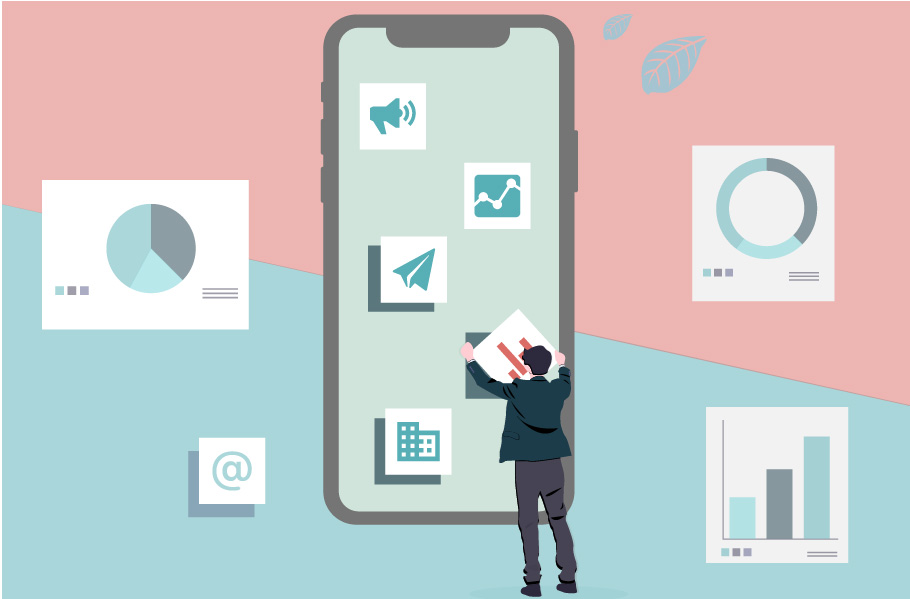We hope you enjoy reading this blog post
If you need help with website or marketing, book a call with our team for a free 360° overview and actionable recommendations report. Book a call

If you need help with website or marketing, book a call with our team for a free 360° overview and actionable recommendations report. Book a call

Artificial Intelligence has been making big news and its use in various fields have already been estimated, one of them being digital marketing. AI has been in existence for a very long time. Everything that we use whether it be GPS, voice assistants, or social media tags, they all run on AI algorithms. AI will continue to grow in adoption in the coming years at a mind-bending rate.
Artificial intelligence (AI), is often used as an umbrella term to describe the different types of technology that can simulate human intelligence. AI techniques teach computers to parse data in a contextual manner to provide requested information, supply analysis, or trigger an event based on their findings.
Machine learning is essentially using algorithms to calculate trends, value, or other characteristics of specific things based on historical data. AI is the marriage of technology and data, and it can be leveraged to produce personally tailored content based on online personas. It can be an efficient use of marketer’s time as it reduces the amount of errors that a human being will make.
Now, one of the sectors, where AI will make a huge impact, is the field of Marketing. The combination of Marketing and AI is considering lethal by many experts and it is believed that many marketing agencies have started to integrate AI into their campaign.
Artificial Intelligence provides insight that can better inform marketers when it comes to content creation and because of AI, it will be much easier for agencies and brands to predict buyer behavior and personas, different search cycles, etc.
Artificial intelligence finds and identifies the best parts about human behavior. It matches our desires with the exact information, product or service we need, at the right time. Using AI and machine learning to map out and skillfully intrude in the customer life journey to increase conversions is one of the biggest opportunities for marketers.
It is increasingly used to improve search results, and it will be the driving force behind the changes in target marketing, content production and advertising that we will see on social media sites like Facebook for example.
Facebook has an impressive collection of data on its users—it might even know more about your spouse or best friend than you do. AI has the ability to leverage such data when working with marketers to automatically deploy content on behalf of a brand to deliver unique customer experiences.
When brands use AI in the development of their marketing tactics, it effectively increases conversions and decreases budget waste. Consumers continue to demand more personalized experiences with the added caveat that they function seamlessly—they want to see the ads they want.
“While AI can help organizations figure out how to speak to audiences, it can also let organizations figure out whom not to speak to, helping clients discern “people likely to unsubscribe and being careful about what to send them,” said Chris Jacob, director of product marketing for Salesforce’s Marketing Cloud.”
Marketers are already leveraging the power of AI to glean valuable insights about their customers, automate tasks, and improve workflows. Just over half (51%) of marketers currently use AI, and an additional 27% are expected to incorporate the technology by 2019, according to Salesforce. This represents the highest anticipated year-over- year (YoY) growth of any leading technology that marketers expect to adopt in the next year, beating out the Internet of Things and marketing automation.
When asked to choose which trending technology they felt most unprepared for, 34% of global marketing executives chose AI, the most of any option, according to Conductor.
Artificial intelligence can help brands evolve in the digital world while maintaining that exceptional customer service by building lasting and highly personalized relationships with consumers.
Many brands are turning to AI for help with their marketing efforts — 60% of e- commerce and retailers anticipate establishing AI marketing strategies within the year, according to an Emarsys study conducted with Forrester. Further, 73% of consumers gravitate toward brands that personalize their shopping experience, which of course results in brand loyalty.
The fundamental differentiator of AI is that it creates new data, something technologies like business intelligence, segmentation, and data analytics can’t do. By analyzing data points and trends, AI can help marketers discover new behavioral patterns and buyer preferences that ultimately increase ROI.
Unorganized or incorrect data is “dirty” data and costs the US about $3 trillion per year, according to Harvard Business Review.
In 2018, marketer responses on the Future of Marketing reveal quite different patterns of technology adoption and benefits.
In this year’s survey, nearly 75 percent of all marketers responded that three trends are dominating the thinking of marketers. Additionally, each of the top three themes require and use Artificial Intelligence today. According to marketers, the next big technology in 2018 is as follows:
Marketers looking to integrate AI into their strategies can start by researching current technology partners that are part of their current workflow, looking at current platforms applying AI and learning about the power of AI. The most innovative companies are natively integrating AI into their platform, making it possible for any marketer to be an AI-first marketer today. AI has emerged as the biggest player in the market and those who will not adopt AI in the near future will be shown the door.
Please complete the form below and one of our team members will be in touch shortly.